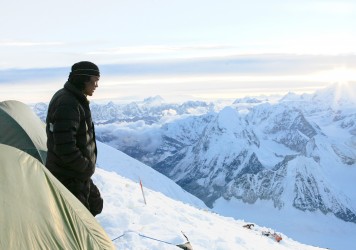This big, brassy ’70s-style disaster movie wears its clichés lightly and packs a hefty emotional punch.
It’s time we expunged all this hooey about the purported Jake Gyllenhaal renaissance from our minds. We refer to the recent phase of his acting career where he stars in films in which he appears to be straining way too hard for effect (cf Enemy, Prisoners, Nightcrawler, Southpaw). Baltasar Kormákur’s Everest is an ace, merrily archaic disaster movie that Gyllenhaal, in a weirdy-beardy lovable rogue supporting role, appears to be treating as “one for them”.
He’s more laid back than usual, unselfconsious, with no sign of deep method character immersion, or that he’s trying to subtly articulate everything he’s feeling for the camera. And it’s his best work in a long time – the empathy for his character shines through effortlessly. Though this film deals quite literally in the highest of high drama it’s an agreeably mellow exploration of when human life becomes the stake for wild physical endeavour.
Jason Clarke, an actor whose rabbit/headlights turns in juggernaut blockbuster franchises such as Terminator Genisys and Dawn of the Planet of the Apes, comes into his own when asked to play a chipper dullard. In this case, it’s commercial mountaineering guide Rob Hall, and the film, based on Jon Krakauer’s reportage bestseller, ‘Into Thin Air’ as well as Beck Weathers’ ‘Left for Dead: My Journey Home from Everest’ and various transcriptions of sat-phone recordings, offers a retelling of the unfortunate events which occurred in May of ʼ96.
Without going into too much detail, it’s a simple case of a certain amount of people going up the mountain, and a diminished number being able to make their way down. The film exposes a certain futility when it comes to working in the extreme sports arena, suggesting that guides, trainers and experts are perhaps a little too casual with the potential dangers of their chosen occupation. They celebrate life’s potential by nervously chest-bumping death right out of the frame.
There is, at times, the faint bouquet of cheese, especially when over-eager side players intone their earnest reasons for wanting to conquer the world’s highest summit and, often, concurrently signposting their own dim future. Yet Kormákur’s film – certainly one of his best – does not play into the hands of drab convention, offering a detailed, near 80-minute build up to the eventual fireworks, which pays huge dividends when you’re actually asked to worry about the fate of these characters.
Where Everest works best is in its simple decision to settle its focus on the people rather than the dispassionate forces of nature. There is also no human antagonist. The mountain is the cackling bad guy here. What we have are just ordinary people coerced into making life or death decisions in impossible circumstances, the dire consequences of which are entirely unknown.
This is also a film about the ’90s, about the rise of dude culture and the commercialisation of (male-dominated) extreme sports as suitable for stocky businessmen on the cusp of mid-life crisis (Josh Brolin), plucky postmen who have wasted their life in the service industry (John Hawkes) or gung-ho journalists looking for their next rad longread (Michael Kelly). Yet itʼs the maternally- minded female characters – from Keira Knightley’s housebound wife to Emily Watson and Elizabeth Debickiʼs basecamp liaisons – who lend this tragedy its humane and heartbreaking edge.
Published 15 Sep 2015
Baltasar Kormákur’s recent hack-for-hire work (Two Guns, Contaband) dulls the excitement somewhat.
A remarkable mountaineering melodrama rather than a standard-issue disaster movie.
Pardon our French, but this could easily turn out to be an Oscar dark horse.

Ever dreamed of one day scaling Mount Everest? This powerful doc about a Nepalese community will make you reconsider.